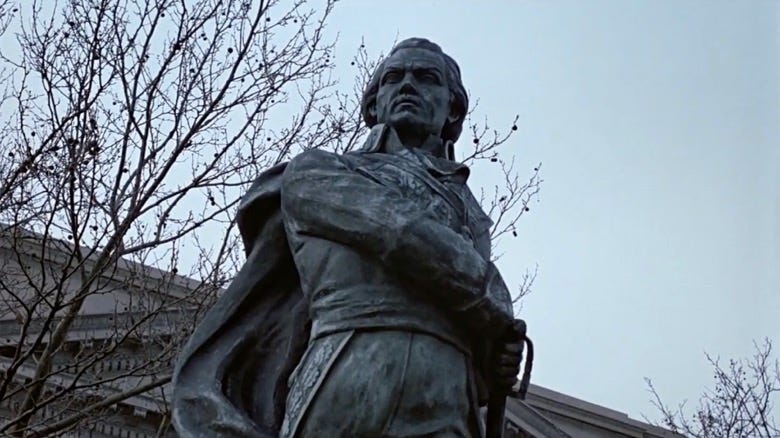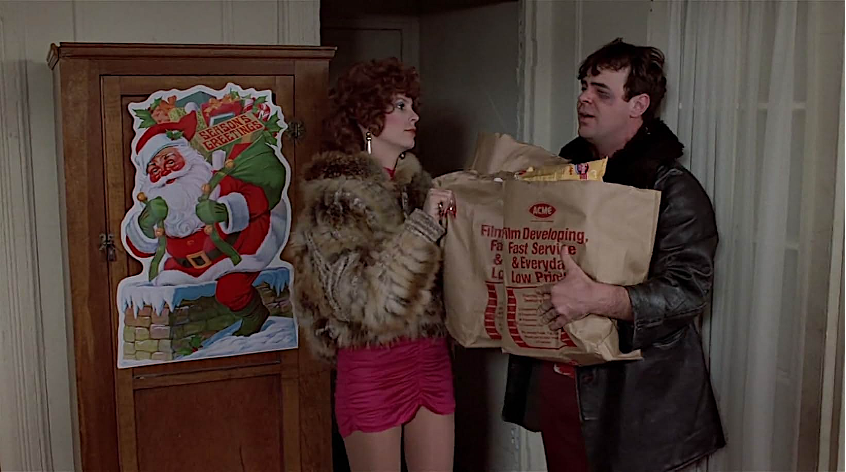Looking Good, Billy Ray!
Trading Places
1983 Director: John Landis
Starring: Dan Aykroyd, Eddie Murphy, Ralph Bellamy, Don Ameche, Denholm Elliott, Jamie Lee Curtis
Louis Winthorpe III (Aykroyd) lives a great life. He is a young, successful commodities broker who grew up under the best circumstances. He manages Duke and Duke, a brokerage firm in Philadelphia owned by Randolph and Mortimer Duke (Bellamy, Ameche). One morning, as the two brothers arrive at the exclusive Heritage Club in their limo, Billy Ray Valentine (Murphy) annoys them by panhandling aggressively. He pretends to be a disabled veteran reduced to begging, but these wealthy men are not sympathetic.
Once comfortably inside the club, Randolph and Mortimer return to one of their favorite debates, the “nature vs. nurture” theory. Randolph believes that environment is all important in shaping a person’s character and outcome in life; Mortimer disagrees. When Louis exits the club, Billy Ray bumps into him, which leads Louis to summon the police, believing he is being robbed. Billy Ray is arrested. Witnessing the commotion, the brothers put their theory into practice. They wager that Louis and Billy Ray’s economic status would be transformed by manipulating their circumstances.
The Dukes first ensure that Louis loses his home, job, money, and butler (Elliott) by framing him as a thief and drug dealer. Mortimer and Randolph bail out Billy Ray and offer him all Louis had. Randolph was correct: Billy Ray thrives because of his new advantages, while Louis now struggles with homelessness, poverty, and lack of credibility. Billy Ray and Louis will eventually discover what happened, join forces, and take revenge.
“Trading Places” examines human nature and avarice in this comedy, particularly at Christmastime when generosity is expected. One might say that Randolph and Mortimer share the role of Scrooge in this film, primarily for the sake of dialog and character development. Early on, Randolph calls out his brother: “Mother always said you were greedy.” Mortimer responds: “She meant it as a compliment.” Louis also comments on Mortimer’s avarice when he thinks that they are overpaying their employees: “Can’t get around the old minimum wage, Mortimer.”
The film’s pointed message about greed and economic opportunity is at times expressed through subtleties. For example, the opulent overture to Mozart’s “Marriage of Figaro” plays even before the story begins, as contrasting scenes of poverty and wealth in Philadelphia serve as backdrops to the film credits. The opera reference is appropriate because it presents a conflict between the rich and the poor. Also, Louis whistles one of its arias about revenge, “se vuol’ ballare,” which alludes to the fact that he will later get even with his employers. In addition, Billy Ray mentions another opera when he seeks the attention of a beautiful passerby who rebuffs him. He asks her, “Didn’t you ever see ‘Porgy and Bess’?” which tells the story of a crippled Black beggar.
In addition to music, art hints at the men’s character in the movie. As the Dukes relax upon arrival at their prestigious club, a reproduction of the Augustus of Primaporta can be seen as part of the room’s décor. This sculpture depicting the first Roman emperor has his hand raised as if commanding his troops or making a speech. His gesture is one of authority, implying the power wielded by the two brothers.
In contrast to the Augustus statue, images of military officers from the Revolutionary War—George Washington, Francisco de Miranda, and John Barry—imply Louis and Billy Ray’s predicament. They are in for the battle of their lives. The sculptures also hint at the film’s underlying theme of liberty and justice: both men are wrongly accused of crimes they did not commit and jailed. These and other landmarks also establish the movie’s location in Philadelphia, where the Declaration of Independence was first adopted and the Liberty Bell is located.
Art also plays a humorous role in the film. As Randolph and Mortimer seek to destroy Louis, the men at the Heritage Club are summoned to a meeting. Inside a grand audience hall filled with paintings of past members, Louis is accused of theft. As he is escorted out by two guards, the camera picks out several of the paintings in the room. One of them, a group portrait in which five men confer, mirrors the stoic concern and disdain of those gathered at the club.1 On his way out, Louis asks for a fair hearing, but none is granted.
Fairness and generosity are important themes here because this is a Christmas film. And perhaps the best example of this is depicted through Ophelia’s (Curtis) character as a hooker. She is the only one who tries to rescue Louis when he loses everything. She feeds and houses him and takes care of him when he is sick. And in reality she stands to lose much by trusting him. Although films traditionally show men saving women, here we see the opposite. And as the saying goes, sometimes the most generous people are those with the least.
Copyright © 2024 by Rosi Prieto, Ph.D.
All Rights Reserved
See the following regarding the Huntington painting: https://www.nysm.nysed.gov/research-collections/history/cultural-history/news/atlantic-cable-projectors







RRosi, as usual, your review of "Trading Places" offers a thoughtful analysis that delves beyond the film's surface. I appreciate how you explore themes of social class and economic inequality, highlighting the clever use of comedy to address serious topics. Your insights into the symbolic use of music and art add a layer of depth that I had glossed over when I watched the film.
I also admire how you highlight Ophelia's role in challenging traditional gender roles, which is a nuanced observation. Your ability to connect these elements to broader societal critiques demonstrates a keen understanding of the film's intentions.
As always, your review serves as a wonderful reminder to look deeper into not just movies but life itself. It inspires me to approach films and personal experiences with a more observant and thoughtful perspective. "Trading Places" is one of my favorite films, and it feels especially relevant today as the puppeteers in charge wildly swing the political pendulum. Thank you for sharing such an insightful review!